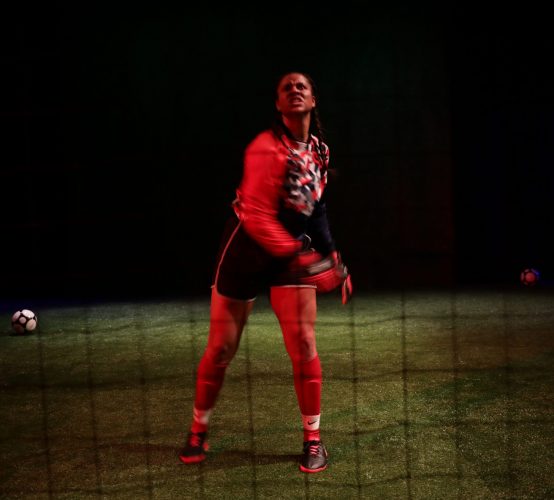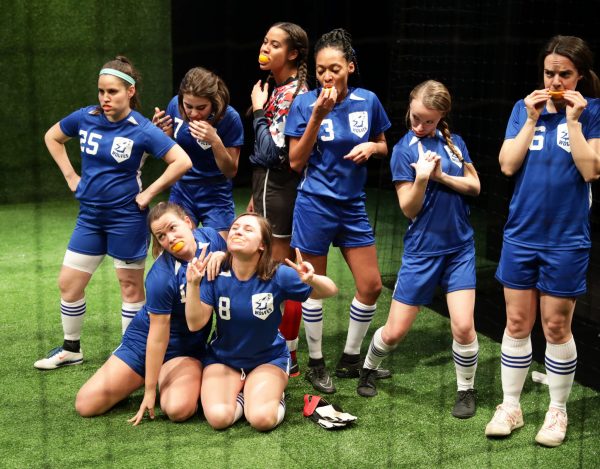Theater Review: “The Wolves” — A Woman’s World
By David Cruz
Director A. Nora Long’s decision to collaborate with an all female-identifying design team and crew underscores her commitment to a feminist vision.
The Wolves by Sarah DeLappe. Directed by A. Nora Long. Staged by the Lyric Stage Company of Boston at 140 Clarendon Street, Copley Square, Boston, MA through February 3.

Simone Black in the Lyric Stage Production of “The Wolves.” Photo: Mark. S. Howard.
The Wolves follows a team of high school girls as they compete in a winter indoor soccer league. The season is designed to be grueling; athletes can expect to play multiple games in a single weekend. Playwright Sarah DeLappe has described the work as “a war movie – but about girls soccer.” While their peers use the period between the more serious spring and fall seasons to pursue other opportunities (i.e., basketball, the school play), these girls continue to dedicate themselves to the sport. Many have played this way since childhood, performing alongside the same teammates year after year. As they enter the spring of their junior year, the girls’ dedication has grown stronger as they consider — and are considered for — a college career. The pressure will be familiar to younger audience members (myself included), who are familiar with the challenges of being a high school student in the new millennium.
DeLappe, who was named a Pulitzer finalist for this work, has a fabulous ear for realistic dialogue. All of these young women are given strong, distinct voices. The girls’ conversations are filled with everyday fodder: they plan sleepovers, gossip about a new teammate, and joke about their lazy coach. They also grapple with more serious questions. Should an octogenarian be charged with war crimes committed many years ago under the Khmer Rouge? What can teens do for Central American children caged by the border patrol? It has become standard strategy in contemporary American plays to juxtapose incongruities (light/dark, trivial/momentous). But DeLappe’s mastery of the technique make it feel fresh. The characters’ comments lack adult sophistication, but their energy and curiosity are boundless. The fast clip of the dialogue creates a compelling momentum as the girls continually lurch toward the next topic.
The play’s quicksilver pacing means you have to pay attention. DeLappe expects the viewer to be an active participant, picking out bits of exposition as they fly by, tucked into the talky world conjured up by its nine characters. The sports setting and physical activity — drills, warm-ups, stretches — punctuate these conversations, emphasizing beats in the dialogue. As the play progresses, the team faces the challenges of accepting a new player, the season-ending injury of their star striker, and an unexpected tragedy.
Because The Wolves takes place in the moments before weekend games, the physicality of the production poses an endurance test for the cast and raises obstacles for director A. Nora Long‘s blocking. When handling dialogue, Long leans on the sharp contrasts between the frivolous and the dark, the childish and the mature. The script balances each element, but Long’s drastic shifts create problems in the flow of the narrative, creating a fluctuating tone. There are awkward moments when the conversational rhythms sputter and stutter.
A true ensemble piece, no one character’s arc dominates; though #46 (Lydia Barnett-Mulligan) — the misfit who just moved from out of town — seems the most obvious protagonist. To show that #46 doesn’t fit in, she performs exercises out of sync with the rest of the team during a warm-up (her jumping jacks are off the beat; it seems implausible she wouldn’t correct herself after a few moments). Barnett-Mulligan’s performance at times veers toward caricature; she often blurts out clumsy or inappropriate comments when conversing with the team. (“My grandma has emphysema!” she exclaims when the disease comes up in the first scene.) It seems that #46’s off-the-wall dialogue is used (by the dramatist) for the sake of comic relief; it is not a convincing reflection of an earnest (if ineffective) overture to connect with the other girls. Another example of clashing tones comes at the end of the play. The girls are recovering after a tragedy, only to have the mood disrupted by the entrance of a distraught soccer mom (Laura Latreille), whose over-the-top energy disrupts what should have been a tender moment.

The cast in the Lyric Stage Company production of “The Wolves.” Photo: Mark S. Howard.
The players remain nameless for most of the play. Instead, they refer to each other by number, underscoring the vital role of the sport in their lives. There are many fine performances: Olivia Z. Cote evokes #7’s frustration and resilience when a torn ACL brings her season to a premature end, putting her chance at college play in jeopardy. Valerie Terranova’s #25 is also striking as the team’s captain, who feels pulled between leadership and friendship in each interaction with her teammates. The production’s major drawback is that Long focuses on the relationships between the girls, to the point that it tamps down a crucial part of the story: the girls’ relationship to the sport itself. For example, in an early scene the captain leads the team through a series of drills. The script calls for no dialogue — the captain calls out each drill, one by one. Long has the cast members ad lib conversations while they run around the theater. The result is amusing, but it detracts from the sense that these girls are committed athletes.
This undercutting of the athletic stakes ends up lowering the stakes of the drama. When #7 receives a serious injury, she blames the captain for cutting short the team’s time for stretches before the game. It is hard not to take this accusation as a defense mechanism, an obvious deflection of responsibility. (It’s revealed later that she probably made the injury worse by skiing on it.) The goalie (Simone Black) is a mysterious, silent girl who appears to be socially inept and paralyzingly shy. Eventually we learn that she constantly visualizes failure, struggling with severe performance anxiety. But that revelation doesn’t resonate. When have these players really been focused on the game? In this production, soccer comes off (mostly) as an afterthought — a college scout appears at a game. When the girls notice him speaking to their coach, they quiet down. They then move to the next stretch in unison, creating a collective rhythm that evokes the discipline that’s been missing until that point.
Long’s focus is less on the collective action of sport than on the script’s honest representation of relationships among women, particularly teenage girls. Her decision to collaborate with an all female-identifying design team and crew underscores her admirable commitment to feminist theater. And The Wolves serves up plenty of revelations, as DeLappe celebrates the drives, struggles, and successes of her characters. Despite stumbles in tone, the Lyric Stage Company production builds a memorable “planet of teenage girls.”
David Cruz is a radio producer and civic technologist. He has been an associate producer at Human Media and Programming Director at WYBCX Yale Radio. He currently works for the Commonwealth of Massachusetts.
Tagged: David Cruz, Lyric stage company of boston, Sarah DeLappe
